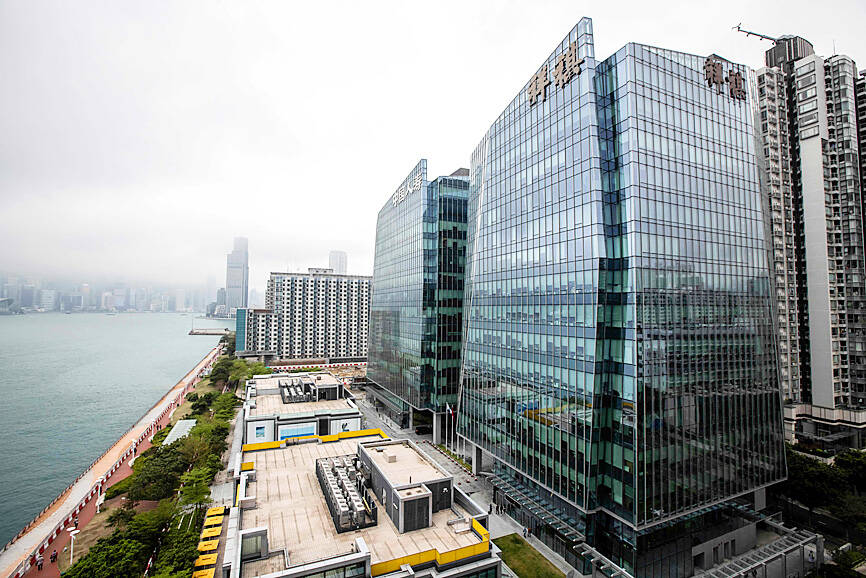Country Garden Holdings Co (碧桂園), China’s largest property developer, reported a first full-year loss since its 2007 listing in Hong Kong.
The Foshan-based company posted a net loss of about 6.1 billion yuan (US$886.5 million) last year, compared with a profit of 27 billion yuan a year earlier. The developer warned of the loss earlier this month.
The result underscores how a slump in China’s real-estate sector is weighing on some of the strongest private builders that have avoided a default so far.

Photo: AFP
While early signs of a housing market stabilization have finally emerged, the turnaround remains tenuous. A chunk of Country Garden’s land bank is in low-tier cities, which usually have higher inventory and weaker housing demand.
Revenue stood at 430 billion yuan, roughly in line with the 427 billion yuan estimate compiled by Bloomberg. Core net profit, which adjusts for items including property revaluation, reached 2.6 billion yuan, the company said.
Meanwhile, a Chinese tycoon’s US$271 million mansion in the luxurious Peak neighborhood of Hong Kong was taken away by a bank, just years after the businessman made headlines with his record-breaking shopping spree.
Chen Hongtian (陳紅天), chairman of Hong Kong-based investment firm Cheung Kei Group (祥祺集團), also had an apartment in the Frank Gehry-designed Opus building and the Cheung Kei Center in the territory’s Hung Hom area seized.
In total, he lost about US$1.4 billion of properties in recent months, in Hong Kong and London, according to data compiled by Bloomberg.
Chen’s plight underscores the liquidity crunch that Chinese real-estate entrepreneurs are facing. He joins a number of tycoons — including China Evergrande Group (恆大集團) chairman Hui Ka Yan (許家印) — in losing control of their luxury properties.
The house on the Peak was taken earlier this month by Bank of East Asia Ltd (東亞銀行), while Bank of Communications Co (交通銀行) seized the Opus apartment last month, documents from the government showed.
On Tuesday, a receiver was appointed for the Cheung Kei Center, according to a Companies Registry filing. It was taken by Hang Seng Bank Ltd (恒生銀行) through PricewaterhouseCoopers LLP.

Semiconductor business between Taiwan and the US is a “win-win” model for both sides given the high level of complementarity, the government said yesterday responding to tariff threats from US President Donald Trump. Home to the world’s largest contract chipmaker, Taiwan Semiconductor Manufacturing Co (TSMC, 台積電), Taiwan is a key link in the global technology supply chain for companies such as Apple Inc and Nvidia Corp. Trump said on Monday he plans to impose tariffs on imported chips, pharmaceuticals and steel in an effort to get the producers to make them in the US. “Taiwan and the US semiconductor and other technology industries

SMALL AND EFFICIENT: The Chinese AI app’s initial success has spurred worries in the US that its tech giants’ massive AI spending needs re-evaluation, a market strategist said Chinese artificial intelligence (AI) start-up DeepSeek’s (深度求索) eponymous AI assistant rocketed to the top of Apple Inc’s iPhone download charts, stirring doubts in Silicon Valley about the strength of the US’ technological dominance. The app’s underlying AI model is widely seen as competitive with OpenAI and Meta Platforms Inc’s latest. Its claim that it cost much less to train and develop triggered share moves across Asia’s supply chain. Chinese tech firms linked to DeepSeek, such as Iflytek Co (科大訊飛), surged yesterday, while chipmaking tool makers like Advantest Corp slumped on the potential threat to demand for Nvidia Corp’s AI accelerators. US stock

The US Federal Reserve is expected to announce a pause in rate cuts on Wednesday, as policymakers look to continue tackling inflation under close and vocal scrutiny from US President Donald Trump. The Fed cut its key lending rate by a full percentage point in the final four months of last year and indicated it would move more cautiously going forward amid an uptick in inflation away from its long-term target of 2 percent. “I think they will do nothing, and I think they should do nothing,” Federal Reserve Bank of St Louis former president Jim Bullard said. “I think the

Cryptocurrencies gave a lukewarm reception to US President Donald Trump’s first policy moves on digital assets, notching small gains after he commissioned a report on regulation and a crypto reserve. Bitcoin has been broadly steady since Trump took office on Monday and was trading at about US$105,000 yesterday as some of the euphoria around a hoped-for revolution in cryptocurrency regulation ebbed. Smaller cryptocurrency ether has likewise had a fairly steady week, although was up 5 percent in the Asia day to US$3,420. Bitcoin had been one of the most spectacular “Trump trades” in financial markets, gaining 50 percent to break above US$100,000 and